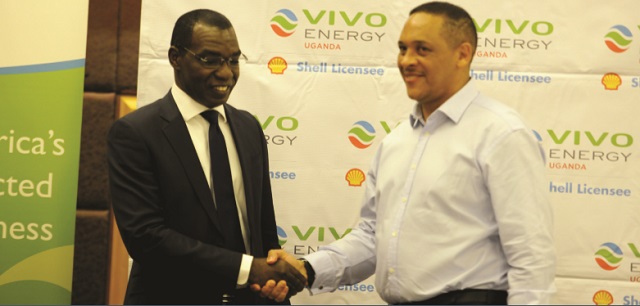
He promises to invest more in the one-stop shops
Gilbert Assi has been unveiled as the managing director of Vivo Energy Uganda and replaces Hans Paulsen, who has been promoted to a new senior role in the Vivo Energy Group.
Assi, an Ivorian national with over 20 years experience has worked in many positions with Vivo Energy and Shell across six African countries. Prior to his latest appointment, Assi had spent two years as managing director of LPSA, Vivo Energy’s joint venture transport, storage and shipping company in Madagascar.
Speaking for the first time to the media on June 1 in Kampala, Assi said he hopes to continue investing in the company’s networks of fuel stations to provide “friendly and welcoming spaces to customers.”
“Our strategy is simple; we will continue to invest in the experiences that keep bringing back the customers to the company’s premises,” he said, “We shall invest more in the one-stop shops (restaurants, banks, pharmacies) at the Shell petrol stations and other activities that will make you want to be with Shell.”
“We will live by our core values of honesty; integrity and respect for people (and) you can see this by the quality of our products and the commitment to sustainable development, safety and passion for our customers.”
Assi comes into Uganda at a time when the country is intensifying efforts to commercialize its 6.5 billion barrels of crude oil in the Albertine region of western Uganda.
Some of the country’s petroleum will be produced locally when a 30,000 barrels-per-day refinery is constructed in Hoima District while bigger volumes will be sold to the international market through a crude oil export pipeline. The government insists these facilities will be in place before the end of 2020.
Assi is aware of all these developments. He told The Independent that he is excited by the fact that Uganda is ramping up efforts to commercialize its oil resources.
He said, should the refinery be in place in the next three years, Vivo Energy will be assured of steady supply of finished petroleum products.
He disclosed that Vivo Energy alongside other undisclosed local and international oil international marketing companies are already negotiating with the government to have their project (on storage) approved.
“If the refinery comes to life, we will be there to build the storage facilities to help in the distribution of oil products to ensure reliability of supply within the country,” he said, “We hope the government will give us a positive response.”
Assi also hopes that the price for liquefied petroleum gas (LPG) which remains unaffordable for the average Ugandan will soon drop.
According to the Ministry of Energy and Mineral Development, consumption of LPG in Uganda remains low. For instance, it only increased marginally from about 1,000 cubic metres in 1994 to about 8,000 cubic metres in 2010 when the last statistics were taken.
Energy experts say consumption is low partly because the price of cylinders and accessories is quite high but also Uganda relies on imported LPG. Transport costs make LPG relatively expensive in Uganda.
Cerinah Tugume, the corporate communications manager at Vivo Energy Uganda told The Independent that a new filled 12kg metallic cylinder costs Shs 236,000 while an empty cylinder gets refilled at Shs 110,000.
On the other hand, a 6kg metallic cylinder costs Shs 180,000 while refilling it will set the customer back by Shs 57,000.
The cost of LPG is relatively lower in Kenya with the same quantity (a new 12kg cylinder) going for KShs 8,000 (Shs272,000) and Ksh 2,000 (Shs68,000) for refilling while a new 6kg cylinder goes for Ksh5, 000 (Shs170,000)and Ksh 850 (29,000) for refilling.
Most likely this might change in future when Uganda’s gas resources estimated to be in millions of cubic metres get exploited to produce products such as LPG. Assi said it is one of the issues he hopes to push with the authorities.
Assi, an energetics engineer from the National Polytechnic Institute Felix Houphouet-Boigny in Ivory Coast says his management philosophy is simple; he believes in teamwork and is open to new ideas that help his staff live to their full potential.
Hans Paulsen, the outgoing managing director noted that his greatest achievement in the last three years was “maintaining the leading position for the Shell brand in a Ugandan market which is quite competitive.
“We have added in the last three years 30 fuel stations to bring the total number of stations managed by Vivo to 132 across the country,” he said.
Vivo’s major rival, Total Uganda operates 125 fuel stations, which are expected to increase to 162 with the acquisition of Gapco. Currently, Gapco operates 37 service stations across the country.
Mogas Uganda had 35 service stations as at the end of 2015. Paulsen said the company has also put in place a robust quality assurance mechanism across its supply chain right from Mombasa port to its depots all the way to its fuel stations to check adulteration.
For 60 years Vivo Energy was known as Shell across Africa. The company provides fuels, lubricants, card services, shops and other non-fuel services (oil change and car wash) for motorists and businesses in Botswana, Burkina Faso, Cape Verde, Ghana, Guinea, Ivory Coast, Kenya, Mali, Mauritius, Madagascar, Morocco, Mozambique, Namibia, Senegal, Tunisia and Uganda.
****
 The Independent Uganda: You get the Truth we Pay the Price
The Independent Uganda: You get the Truth we Pay the Price



